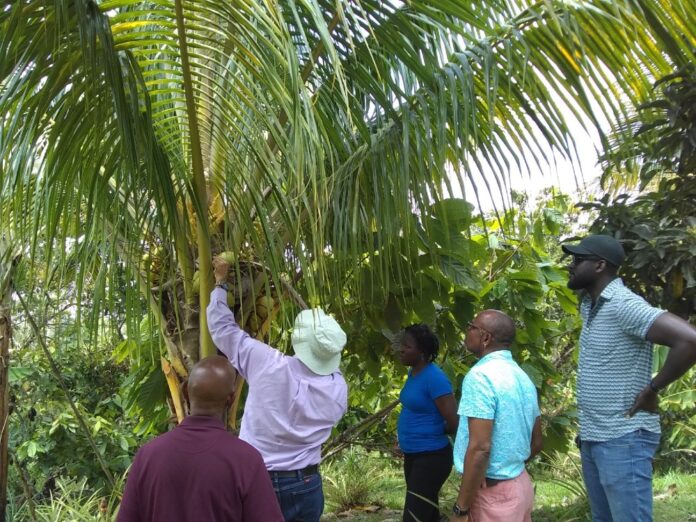
PRESS RELEASE-In St Lucia, like most other Caribbean countries, the coconut culture runs deep. From coconut water to coconut milk and coconut cream and other by-products, even the husks are put to good use in making crafts or for household uses. Its importance is the reason for a collaboration between the Food and Agriculture Organization of the United Nations (FAO) and the Government of St Lucia in developing the Coconut Value Chain.
Through the Ministry of Agriculture, Fisheries, Food Security and Rural Development, along with partners such as the Caribbean Agricultural Research and Development Institute (CARDI), FAO is supporting the development of the coconut sector to improve local production.
During the week of March 13 to 17, 2023, FAO Tree Crop Expert, Dr Abel Rebouças, accompanied by FAO Agricultural Value Chain Development Consultant Ms Sharlene Prosser, provided training in good agricultural practices for coconut production. These trainings included classroom sessions and field-based trainings using a training of trainers approach to further support coconut farmers throughout the island. Coconut farmers, representatives from coconut cooperatives, extension officers and other government representatives as well as representatives from CARDI participated in the week-long training.
Some of the topics covered include, pre- and post- harvest handling, storage, propagation, and hand pollination, harvesting, pruning demonstrations, fertilizer application, integrated pest management, and intercropping options to support quality and sustainable coconut production. The training and recommendations offered will not only support production but will be a part of the necessary activities to strengthen the entire value chain over the coming months.
Mr Juan Cheaz Pelaez, FAO Trade and Markets Officer for the Caribbean and Lead Technical Officer for the project remarked that promoting training in good agricultural practices for coconut production was a crucial part of creating a resilient and sustainable value chain with a consistent and quality supply of coconuts. He added that the training was just one step towards strengthening local capacity to increase the opportunities for better production and a stronger income earning potential for those across the value chain in a way that promotes social, environmental, and economic sustainability.
As St Lucia works towards having a greater stake in the coconut sector and enabling its farmers to utilize proper production techniques, the training was seen as timely and relevant.
Mr Barrymore Felicien, Permanent Secretary in the Ministry highlighted that as coconut and coconut-based products become more popular in households across Saint Lucia, the Agriculture Ministry will partner closely with development partners to initiate activities to bolster productivity within the sub-sector.
The FAO Caribbean value chain development approach, which has seen success in other Caribbean countries, was applied to support this training and will be used in helping to build the coconut industry over the next years. It seeks to help strengthen the sector’s contribution to the country’s Gross Domestic Product (GDP), its recovery from the impacts of the COVID-19 pandemic and contribute to the reduction of the Caribbean Community’s (CARICOM) food-importation bill by 25 per cent by 2025.
The activities being undertaken are a part of the FAO Sub-regional Office for the Caribbean Value Chain Development Programme and are specifically geared towards the Sustainable Development of Competitive and Resilient Value Chains and the implementation of the CARICOM COVID-19 Agri-Food Recovery Plan.
For more information, please contact:
Amanda Clarke
Ministry of Agriculture, Fisheries, Food Security and Rural Development
amanda.clarke@govt.lc or amandafclarke@gmail.com
Sharlene Prosser
Agricultural Value Chain Development Consultant

